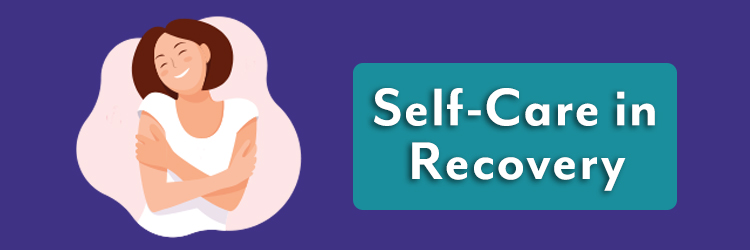The term “self-care” is thrown around a lot in pop culture—but surprisingly, I haven’t seen it used often in relation to addiction recovery. That seems like an oversight; self-care is about taking an active role in your health and well-being, which is what recovery is about too.
Many people see the term “self-care” and think bubble baths or fancy spa days. But self-care at its core is about prioritizing your mental, emotional, and physical health. In order to do this, you have to understand your needs, wants, and boundaries. Even setting a boundary around a person or situation causing you stress is an act of self-care; it’s showing yourself that your emotional state matters.
Understanding your needs enough to meet them requires building self-awareness, which is another important part of recovery. Directed journaling, therapy, and meditation are all activities that can help you figure out your needs and thought patterns.
Staying connected to your friends and support system is a huge act of self-care. The same goes for maintaining your recovery program—whether that’s 12-step fellowships, therapy, or something else. During the COVID-19 pandemic, spending time with the people in your life, in whatever ways you can, is especially important. Prioritizing connection shows you care about your mental health.
We often think of self-care as some special event or activity you do once in a while. But it can look more like building small moments into your days to show yourself support and love. This can even be through exercise or creative pursuits. It can be as simple as allowing yourself 10-15 minutes to just reflect or do nothing. Finding time that’s completely yours is a big act of self-care.
All that said, don’t completely knock bubble baths—or at least that general idea. Sometimes what you might need is some takeout comfort food and a night on the couch. We all need those nights sometimes, especially when we’re working so hard on ourselves in recovery.
I’m five years sober, and I still sometimes see these types of nights as celebrations of—and treats I give myself for—my continued sobriety; I don’t need alcohol or anything elaborate in order to have fun. Whatever your version of takeout food nights is, it can be another type of self-care.
Ultimately, I see self-care not as one particular activity, but as a sort of philosophy of prioritizing your well-being. Self-care isn’t selfish; there are so many sayings like “you can’t give from an empty tank” because we need to take care of ourselves in order to be able to give to others without eventual burnout.
If you are struggling with a mental health or Substance Use Disorder, there is hope. TruHealing Centers across the country offer high-quality and individualized care for addiction and mental health disorders. Our staff—many of whom are in recovery themselves—will help you learn to set boundaries and prioritize your well-being. To find out more, call an admissions specialist at 410-593-0005.








